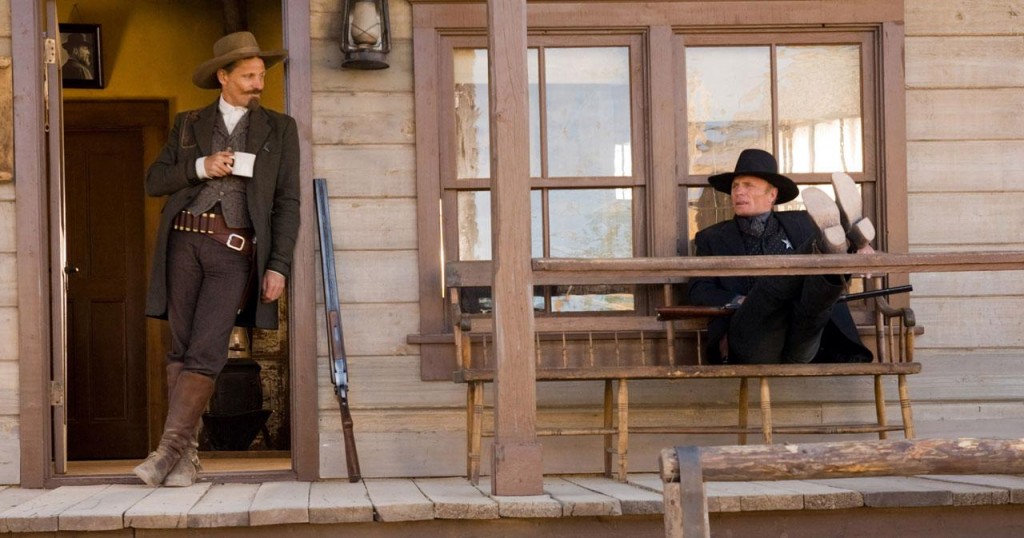
Having just watched Ed Harris’ Appaloosa, I began thinking over the Westerns I have seen over the course of my film-viewing lifetime, knowing that the list was shorter than it should be. However, as I compiled the films in my mind I realized something – the Western is back and perhaps better than ever.
Granted Appaloosa is not the lynch-pin example I am looking for, but it is still part of this revival. Only five years ago a good Western was more than hard to find – it was nearly extinct. Poisoned by a Hollywood reliant on fresh-faced twenty-somethings and faux-blockbuster production quality (see American Outlaws and/or Texas Rangers for proof of these points), the Western became a gimmick genre that worked solely as a opening-week box office draw simply because it featured cowboys in the American West, an image that will never not be enticing.
Since the rejuvenation of the Western in 1992 (the 80s were rough, save Near Dark, Pale Rider and Silverado) courtesy of Clint Eastwood and his realist Western Unforgiven, the genre has not fared so well, save a handful a bright moments. George P. Comatos’ Tombstone followed Unforgiven in 1993 and has since become a modern classic of sorts. Jim Jarmusch’s indie Dead Man featured a young, fresh-faced Johnny Depp as a city accountant thrown into a backwards town of shotgun slingers and outlaws – an enigmatic picture to be sure. Then, in 1999, we were given perhaps the 4 most underrated Westerns in recent memory – John Cusack’s The Jack Bull, the TV-movie Purgatory, the horror Western Ravenous and Ang Lee’s Ride With the Devil. Unfortunately, none of them saw much success commercially, most likely overshadowed by other, more high-profile, poorly-made Westerns, such as Wyatt Earp, Wild Wild West (sweet God that was bad), Sam Raimi’s The Quick and the Dead (do watch it to see a young Leo DiCaprio and Russell Crowe though) and Kevin Costner’s post-apocalyptic Western The Postman, one of the worst films ever made.
Ironically, it would be Costner who would bring the Western back into the mainstream, at least critically, in 2003. Open Range, which he directed and starred in alongside Robert Duvall, is a simply written, simply shot traditional Western that showcases the best Costner has to offer as both a director and an actor. It also features one of the better final shootouts I have ever seen. In that same year veteran Ron Howard tried his hand at the Western with The Missing, a Searchers-esque film that was ultimately a failure, but an indication of equally ambitious, and more successful, Westerns to come.
In 2005, John Hillcoat made the The Proposition, which remains the best Western I have ever seen. Ten times more real than Unforgiven and shot nearly entirely in red hues and tones, this film captures the dirt and grime and blood that most Westerns wash out. Don’t forget, that was the same year Ang Lee made a film about a couple of good-looking gay cowboys. What was the name of that one again?
And here we are, 2009, with the promise of the perfected Neo-Western, which I will define as Unforgiven-on-steroids. There are brave artists out there now, like Andrew Dominick, who gave us The Assassination of Jesse James by the Coward Robert Ford (certainly not perfect, but damn close), and professional entertainers, like James Mangold, who gave us 3:10 To Yuma (although it was acting that made that one great).
Appaloosa is no classic, and I would put in league with The Missing-an ambitious failure. However, if Ed Harris’ psychological study of the West can be deemed a failure now-a-days, there must be some good ones out there. It seems that the West was not simply won by hard-talking white men with guns and hats, but rather men with doubts and guilt and, most of all, regret.
Did I forget a good Western in particular? Disagree?

